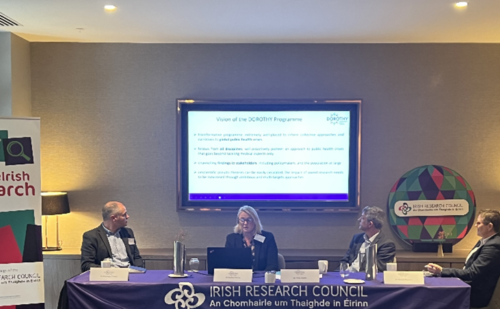Secondment host profile: Drinkaware
By Ana Stefanovska
Posted: 27 April, 2023

DOROTHY COFUND fellows are encouraged to undertake a non-academic secondment as part of their fellowship. Fellows are free to arrange secondments with any relevant organisation, in discussion with their supervisor. However, many organisations within Ireland have indicated an interest in acting as hosts. We will profile some of the potential secondment hosts here on the site, to help you learn more about some of the potential opportunities available.
In this feature, we hear from Dr. Ann Stokes, Research and Impacts Manager at Drinkaware.
- How would you describe Drinkaware’s work and remit to someone unfamiliar with your work?
Drinkaware is the national independent charity working to prevent and reduce alcohol misuse in Ireland, governed by an independent board and regulated by the Charities Regulator. We do this through our evidence-informed programmes at community level with the public and online, through workshops and webinars.
Research plays a critical strategic role in Drinkaware and is viewed as an organisational asset. The charity is committed to ongoing investment in relevant and timely research that is applied to our education and outreach activity and shared with stakeholders to progress collaborative efforts to improve the nation’s health. This ensures each programme we deliver and every resource we produce is evidence-informed and subject to robust independent evaluation to achieve the organisation’s public health goals.
The national research we commission encourages greater understanding of alcohol consumption and its impact. The health promotion resources we provide offer practical ways to drink less or cut out alcohol to protect physical and mental health. Ultimately, we aim to achieve two ambitious goals: 1) Delay the age of first drink, and 2) Reduce the number of adults who drink above the HSE low-risk weekly guidelines.
- Can you describe some of your current ongoing projects?
We believe in an evidence-informed approach to our work at all times. This is why:
- We conduct and commission regular, robust national research studies. This research explores the attitudes, behaviours and drivers of alcohol consumption among adults in Ireland.
- We carry out bi-annual research to assess parental attitudes towards underage drinking and their understanding of the risks associated with early alcohol use.
- We evaluate our programmes to ensure their effectiveness and ability to facilitate behaviour change.
There are several ongoing research projects that are of relevance:
- Barometer Series – the national behaviour and attitudes omnibus survey is conducted by Behaviour & Attitudes (B&A) on behalf of Drinkaware. The Barometer has to date been conducted on 7 occasions and in so doing provides an excellent opportunity to examine the experiences of a nationally representative sample of 1,000 adults 18+ over the course of several years. To date we have completed 3 Barometer Research papers that provide a comprehensive overview of specific findings – families with children, impact of COVID-19, young adults and their wellbeing. The creation of the Barometer Paper Series allows us to dig deeper into our annual surveys to identify important emerging patterns of attitude and behaviour that are affecting the nation’s alcohol consumption. We look forward to working with B&A in 2023 as we carefully consider development of the questionnaire in the context of emergent issues, changes and progresses in Irish society, including the continued implementation of the Public Health Act of 2018.
- Scoping exercise on inequities and the alcohol harm paradox – the Drinkaware research team commenced an initial scoping exercise and review of literature on inequities and the alcohol harm paradox and plan on continuing this project during the second half of 2023. The findings of this extensive review will provide important evidence as part of future development for the new three-year strategic cycle commenced in 2022.
- Research Bank and Website – The Drinkaware research bank development was initiated in 2020 and throughout 2021 and in 2022 we built upon the work that took place in 2020. The aim of the research bank is to encourage understanding, support, and trust in the importance of continued research on alcohol consumption, misuse, and harm, and on related areas of positive behaviour change. The consumption sections of the website are regularly updated to reflect the most up to date data/publications. There were over 8,500 views in 2022, +76% on 2021 illustrating the growing interest in this area.
- Research Briefing Series – In 2019 we launched a new series of research events – the Drinkaware Research Breakfast Briefing series. We created this series to reach out to all stakeholders to build a community of active and interested researchers in the health and behaviour change space. We encourage collaboration both with us and each other through creating an opportunity where we can collectively discuss issues relating to alcohol in Ireland and in so doing, contribute to sharing learnings and knowledge. Continued development/building of the research briefing series is planned for 2023 with open calls to any interested researchers to present in the series.
- If a DOROTHY fellow were to undertake a secondment with you, are you able to give a sense of projects they may be working on?
It is envisaged that the fellow’s potential work would be negotiated at a later date, depending on our needs and the fellow’s training needs and expertise. Our workplans are yearly, it is therefore difficult to predict the fellows’ specific work activities. The above gives an overview of some research projects that we are currently working on but depending on the specific interests of the fellow and our work priorities at the time we can discuss the options. A deeper examination of inequities and the alcohol harm paradox is one of the key priorities for the research team during 2023 and continuing into 2024.
- How would a DOROTHY COFUND researcher working with Drinkaware benefit both Drinkaware and the fellow?
Having a fellow join our small multi-disciplinary team would be an extremely valuable networking opportunity and we believe that we can learn from the fellow too by creating an opportunity where we can contribute to sharing learnings and knowledge relating to alcohol in Ireland. The fellow would also have the opportunity to attend conferences and research events.
- What is most interesting about working with Drinkaware?
Data is almost meaningless if it cannot be related back to actual lived experiences and Drinkaware’s research programme explores why people drink, as opposed to simply the ‘how (much)’. The creation of the Barometer Paper Series allows us to dig deeper into our annual surveys to identify important emerging patterns of attitude and behaviour that are affecting the nation’s alcohol consumption. By extrapolating these insights, and using them to inform our outreach work, Drinkaware is in turn better placed to generate more meaningful engagements with the public, and therefore support broader positive change.
“At Drinkaware research is essential, our campaigns and programmes are evidence-based and rely heavily on both our own research and the research provided by other mission-aligned organisations. Alcohol data is complex and at Drinkaware we strive to ensure that our research is used to inform the public on issues related to alcohol’s impact on their health and wellbeing – providing information and tools that relate to people’s lived experiences, with the aim of leaving no one behind.”
Jennifer Flynn, Director of Communications
If you are interested in including a secondment with Drinkaware as part of your DOROTHY COFUND fellowship, you may want to begin discussion with Drinkaware, along with your main supervisor. Remember that successful fellows can also negotiate a secondment once their fellowship has begun.


